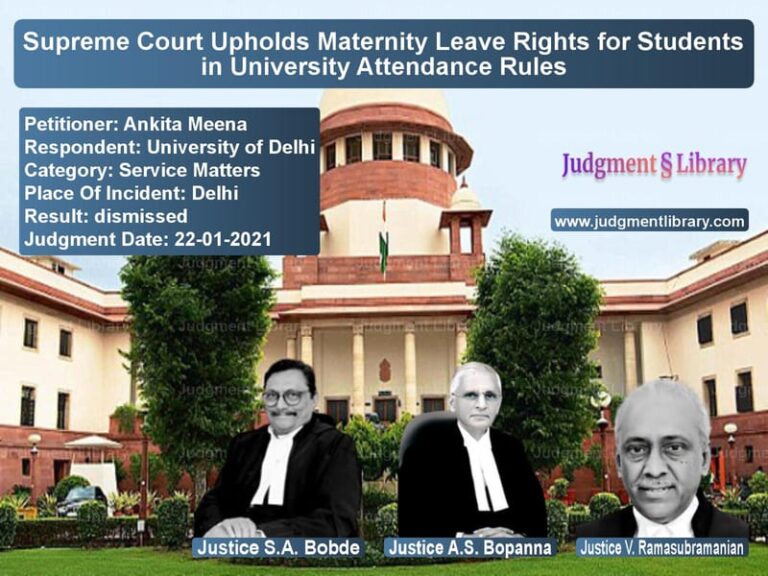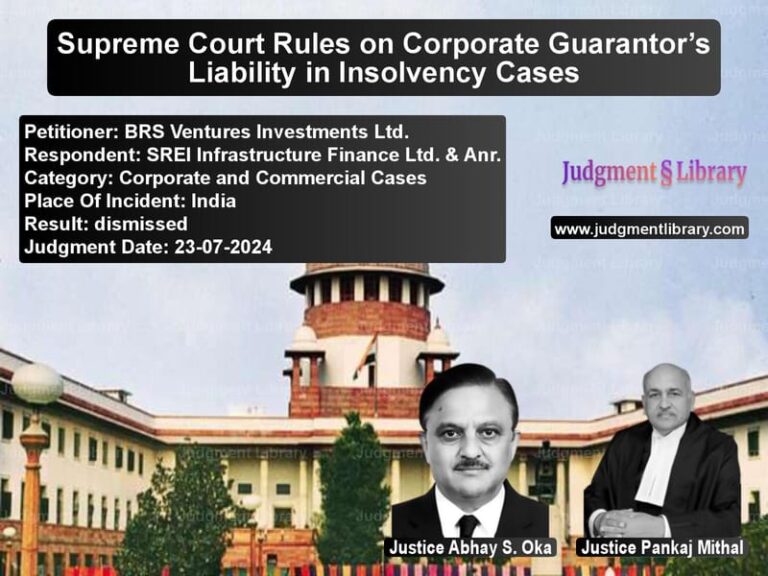Customs Duty Dispute: Supreme Court Partially Allows Appeal in BISCO Limited Case
The Supreme Court of India recently delivered a crucial judgment in M/S. BISCO Limited vs. Commissioner of Customs and Central Excise, addressing key legal questions regarding warehousing, customs duty, and interest liability under the Customs Act, 1962. The ruling provides clarity on the applicability of warehousing provisions, the rate of duty, and the role of customs authorities in monitoring bonded goods.
Background of the Case
The case arose when BISCO Limited imported second-hand steel mill machinery under the Project Import Facility, covered by Chapter Heading No. 98.01 of the Customs Tariff Act, 1975. The company stored the imported goods in a public bonded warehouse within its factory premises in Pithampur, Madhya Pradesh.
The dispute began when customs officials conducted an inspection on August 7, 1992, and found discrepancies in the warehoused stock:
- 304 cases of machinery were found inside the bonded warehouse.
- 264 cases were found outside the warehouse but within the factory premises.
- 27 cases were missing.
The customs authorities alleged that BISCO Limited had illegally removed warehoused goods without paying duty, violating Section 71 of the Customs Act.
Key Legal Issues
- Whether BISCO Limited violated Section 71 by keeping 264 cases outside the bonded warehouse.
- Whether the missing 27 cases were cleared without payment of duty, warranting penalty.
- Whether the customs duty and interest levied by the Commissioner of Customs were justified.
- Whether the Customs Tribunal (CESTAT) erred in upholding the penalties imposed on BISCO Limited.
Arguments by the Appellant (BISCO Limited)
BISCO Limited, represented by its counsel, argued that:
- The goods were temporarily stored outside the warehouse due to heavy rains that made the soil sluggish, preventing trailers from entering.
- The customs authorities had given verbal permission to store goods under a shed within the factory premises.
- The missing 27 cases were not illegally removed, and no proof of unauthorized clearance was provided.
- The imposition of interest and penalties was excessive and not legally justified.
Arguments by the Respondent (Commissioner of Customs and Central Excise)
The customs department contended that:
- BISCO Limited failed to provide clearance documents for the missing 27 cases.
- The 264 cases stored outside the warehouse were not under customs control, violating warehousing regulations.
- The company had to pay customs duty of Rs. 39,03,821 and interest of Rs. 18,88,425 on the goods stored outside the warehouse.
- CESTAT correctly upheld penalties, as the company’s actions violated customs regulations.
Supreme Court’s Observations and Judgment
1. Storage Outside the Warehouse Was Not a Violation
The Supreme Court found that the permission granted by customs authorities to store goods under a shed within the factory premises was not revoked. It ruled:
“The 264 cases found outside the warehouse but within the factory premises were not improperly removed, as permission was granted by customs officials.”
2. Missing 27 Cases: Liability for Duty and Penalty
The Court held that BISCO Limited failed to explain the disappearance of the 27 cases. It ruled:
“The burden of proof was on the company to account for the missing goods. Since no valid explanation was provided, the demand for duty and penalty is upheld.”
3. Interest on Duty Was Not Justified
The Court set aside the interest demand, holding that it was incorrectly calculated:
“Interest under Section 28AB of the Customs Act applies only when there is deliberate evasion of duty. In this case, the demand for interest on the 264 cases is unjustified.”
4. CESTAT’s Order Was Partially Incorrect
The Supreme Court criticized CESTAT for failing to consider key facts:
“The Tribunal overlooked the fact that warehousing permission continued, and the company was not in unauthorized possession of the 264 cases.”
5. Final Ruling
The Supreme Court modified the lower court’s order as follows:
- Customs duty and penalty on the 27 missing cases were upheld.
- The interest demand on the 264 cases was set aside.
- The confiscation order was quashed, and the company was allowed to redeem the goods.
- CESTAT’s decision was partially overturned.
Implications of the Judgment
This ruling has significant implications for warehousing regulations and customs duty disputes:
- Clarifies storage rules: Goods stored within factory premises with permission do not violate warehousing laws.
- Limits interest liability: Customs cannot impose interest arbitrarily under Section 28AB.
- Emphasizes proper documentation: Companies must maintain records for all warehoused goods.
- Reinforces judicial review of customs decisions: Tribunals must consider all facts before upholding penalties.
This decision balances customs enforcement with fair treatment for importers, ensuring due process in warehousing disputes.
Petitioner Name: M/S. BISCO Limited.Respondent Name: Commissioner of Customs and Central Excise.Judgment By: Justice B.V. Nagarathna, Justice Ujjal Bhuyan.Place Of Incident: Pithampur, Madhya Pradesh.Judgment Date: 20-03-2024.
Don’t miss out on the full details! Download the complete judgment in PDF format below and gain valuable insights instantly!
Download Judgment: ms.-bisco-limited-vs-commissioner-of-cust-supreme-court-of-india-judgment-dated-20-03-2024.pdf
Directly Download Judgment: Directly download this Judgment
See all petitions in Customs and Excise
See all petitions in Tax Refund Disputes
See all petitions in Judgment by B.V. Nagarathna
See all petitions in Judgment by Ujjal Bhuyan
See all petitions in partially allowed
See all petitions in Modified
See all petitions in supreme court of India judgments March 2024
See all petitions in 2024 judgments
See all posts in Taxation and Financial Cases Category
See all allowed petitions in Taxation and Financial Cases Category
See all Dismissed petitions in Taxation and Financial Cases Category
See all partially allowed petitions in Taxation and Financial Cases Category







